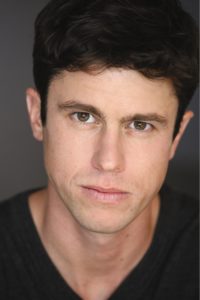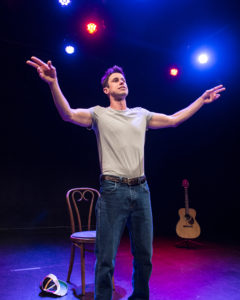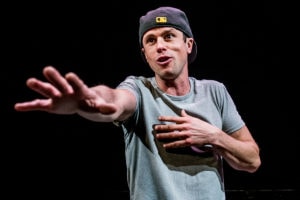Dan Hoyle’s extraordinary solo show The Real Americans is based on his travels through small-town America and the folks he met, many of them part of Trump’s so-called base. When I reviewed the show, I marveled at his knack for empathy with so many people with whom he disagreed:
Hoyle’s performance models a way of being in this politically fractured world as a conscientiously compassionate listener. In bringing us into the lives of others whom we might automatically “otherize,” The Real Americans points to the possibility of a mode of existence that the poet Walt Whitman aspired to when he wrote “I contain multitudes” and the playwright Terrence meant when he wrote “Nothing human is alien to me.”
Afterward it occurred to me that an actor with Hoyle’s skill set might have something to teach people who are not actors—people who are not consistently trying, as he is, to see things through other people’s points of view to the extent he can seem to become the other.
Most people (and I include myself) have a tendency to shut off or scornfully distance ourselves as soon as we hear someone say something we vehemently disagree with—as though in that instant our sense of identity depends on disavowing someone else’s. But I sensed from watching Dan Hoyle in performance that he conducts his writing and acting life very differently. And I was curious to know more from him about why and how.
Following is an excerpt from our conversation on a recent afternoon in the Mosaic green room.
John: Where and when did you do your research for The Real Americans?

Dan: I started doing this research in 2008. I traveled through small-town America for three and a half months, then continued to follow up with people. The show opened regionally in 2010. It ran for a long time and I thought I was done with it. Then it got booked again in North Carolina in 2015, and by the time I got there it was spring of 2016, they had the bathroom bill, Trump was on his way to clinching the nomination, and the audiences were saying: this seems like it was written yesterday. So I went back on the road in 2016-2017 and updated the show.
I was and always have been very transparent about what I do. I tell people I’m an actor and a playwright, I’m gathering stories to create a play, I create characters based on the people I meet and the stories I hear. So people know what I’m doing.
Listening is really important. I also started to feel like I’m an ambassador: a progressive urban dweller who tries not to be arrogant or elitist or any of the things that we get painted with. I call it the journalism of hanging out. That’s William Finnegan’s phrase, which I love.
I’m from San Francisco and New York. I present very much not as a small town or rural person. It’s important to acknowledge that context. But some of the power of this work is when you can transcend that context, when you can actually be honestly sharing with somebody across lines of race, class, gender. There’s a lot of skill in being able to get people to move past that. It’s the challenge I give myself, and it’s the challenge I then give my audiences, to say: hey, I really went out there with an honest and open mind. I tried to engage with people openheartedly but also ask questions that could be uncomfortable.

What prompted you to do this research?
For me it came from looking at the red-state/blue-state divide, which is kind of a misnomer because small-town, rural America/metro-America really is where the fault line is. And there was a lot of talk about why there are not more conservative characters on stage. So I thought: well, that’s an interesting challenge: Can I go out and talk to conservative folks and put them onstage and make them authentic, accurate, nuanced, and have the audience feel empathy for them—but it be okay that they don’t agree with them?
How did you do that?
When you really focus you let everything else go away. I call it open time. I think our brains have an evolutionary ability to take someone in on a deep level and then have that person be summoned within yourself. I think it’s latent within all of us. Of course, it’s hours and hours and hours. It takes me about two years to write a show. And a lot of that is in front of the mirror, first creating the voice and then the physicality. When I believe the person that I’m seeing in a mirror feels like a real person then I feel like I’m getting somewhere.
I really want to feel like I’m meeting somebody, that we’re being transported into this person’s world as opposed to: oh wow, this actor is doing that person so well.
I think that in order to become someone, you have to try to see the world through their eyes. That is the same thing that I do as a journalist, as a researcher, trying to understand how they think and move and talk and feel. And then you take the next step and try to actualize that within yourself.
In a solo show it’s crucial to have a way in for the audience. And to do it well, you have to have creative hooks to both welcome and grab the audience. For me in The Real Americans, the hook was the brunch characters, who hopefully audiences can both laugh at and also see part of themselves in. Then they say: oh okay I’m on board; this guy is coming from an honest place about his own culture; now we’re going to go see these other cultures, and he is trying to do it with empathy and open-mindedness. It gives people permission to then get on this trip with me.

If you could communicate what you know about what you do, what would you say?
To say “Let’s try to see this from the other side” doesn’t mean that you are disavowing your own views or goals. It actually is essential towards achieving them. Otherwise you’re just not really knowing what is the reality.
The Trump electorate is quite diverse. I met black folks, I met Latino folks, I met Muslim folks, I met lots of women who voted for him. So to say that all of those people are irredeemable is just tactically poor. If we write off everyone who voted for Trump, it’s just going to get worse. If you keep ignoring and not trying to engage with a real tactical strategical ability, then you’re going to lose.
I’ve been doing this show since 2010, and as I say now in the show: at first it was a warning and now it’s a reality.
What do you hope people will take away from The Real Americans?
I hope there’s two things that my work does: One, entertain people, ’cause if you make people laugh you can tell them anything. But two, to encourage a way of thinking critically outside of yourself, to encourage people to step out of their own bubbles in some way in their life. When you are curious about people’s lives in a genuine way, I think people recognize that. Most people are not understood and they want to be understood. So if you go in with a genuine desire and show some aptitude in being able to understand people, they will tell you their story.
The truth is, things are messy. And cultures collide. I’m working on a new show called Borders, No Borders, and it’s about people who are between many different camps and how they walk between them. And we all do. It’s not a betrayal to have an identity that is fluid and multiple. It’s important to be able to have transcendence across those lines for moments. And I think you can. And I think it’s one of the great pleasures of being a human being.
Running Time: 70 minutes, with no intermission.
The Real Americans plays through December 22, 2017, at Mosaic Theater Company of DC performing in Lab II at Atlas Performing Arts Center – 1333 H Street NE, in Washington, D.C. For tickets, call the box office at (202) 399-7993 ext. 2, or purchase them online.
From December 1 to 24, 2017, Dan Hoyle’s The Real Americans plays in rep with Mashuq Mushtaq Deen’s Draw the Circle.
LINKS:
Review: ‘The Real Americans’ at Mosaic Theater Company by
Review: ‘Draw the Circle’ at Mosaic Theater Company by
VIDEO:





